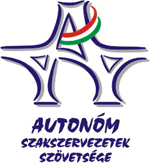Autonomous Trade Union Confederation | |
| Autonóm Szakszervezetek Szövetsége | |
 | |
| Headquarters | Budapest, Hungary |
|---|---|
| Location | |
| Members | 120,000 |
| Affiliations | ITUC, ETUC |
| Website | www.autonom.hu |
The Autonomous Trade Union Confederation (ASzSz) is a national trade union center in Hungary. It has a membership of 120,000.
The ASzSz is affiliated with the International Trade Union Confederation, and the European Trade Union Confederation.